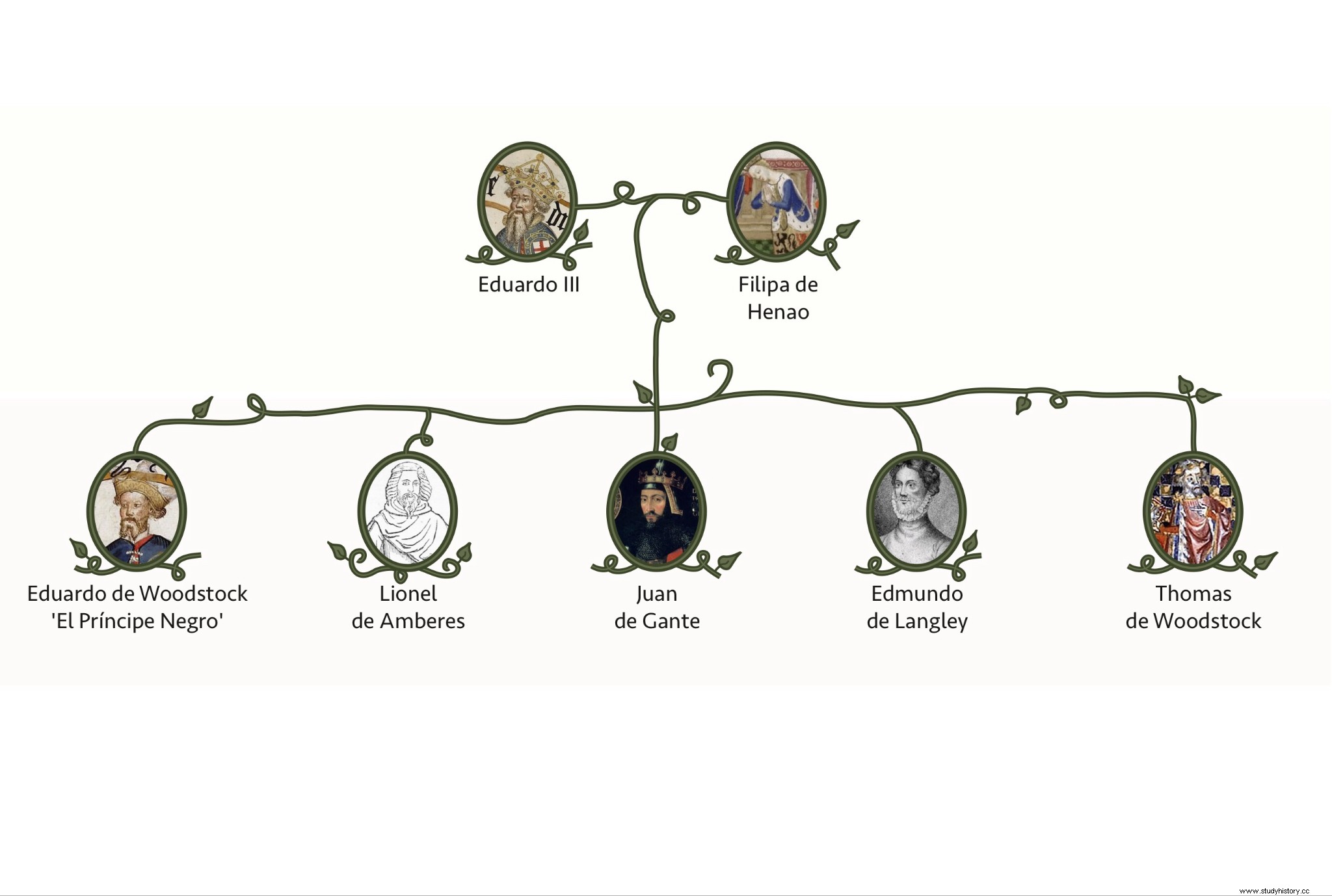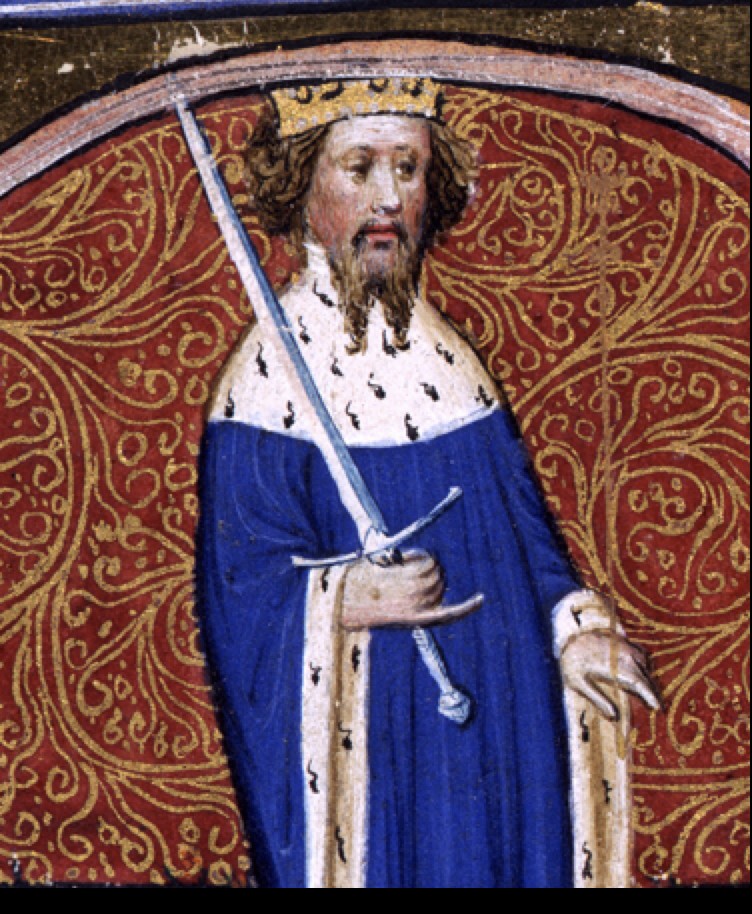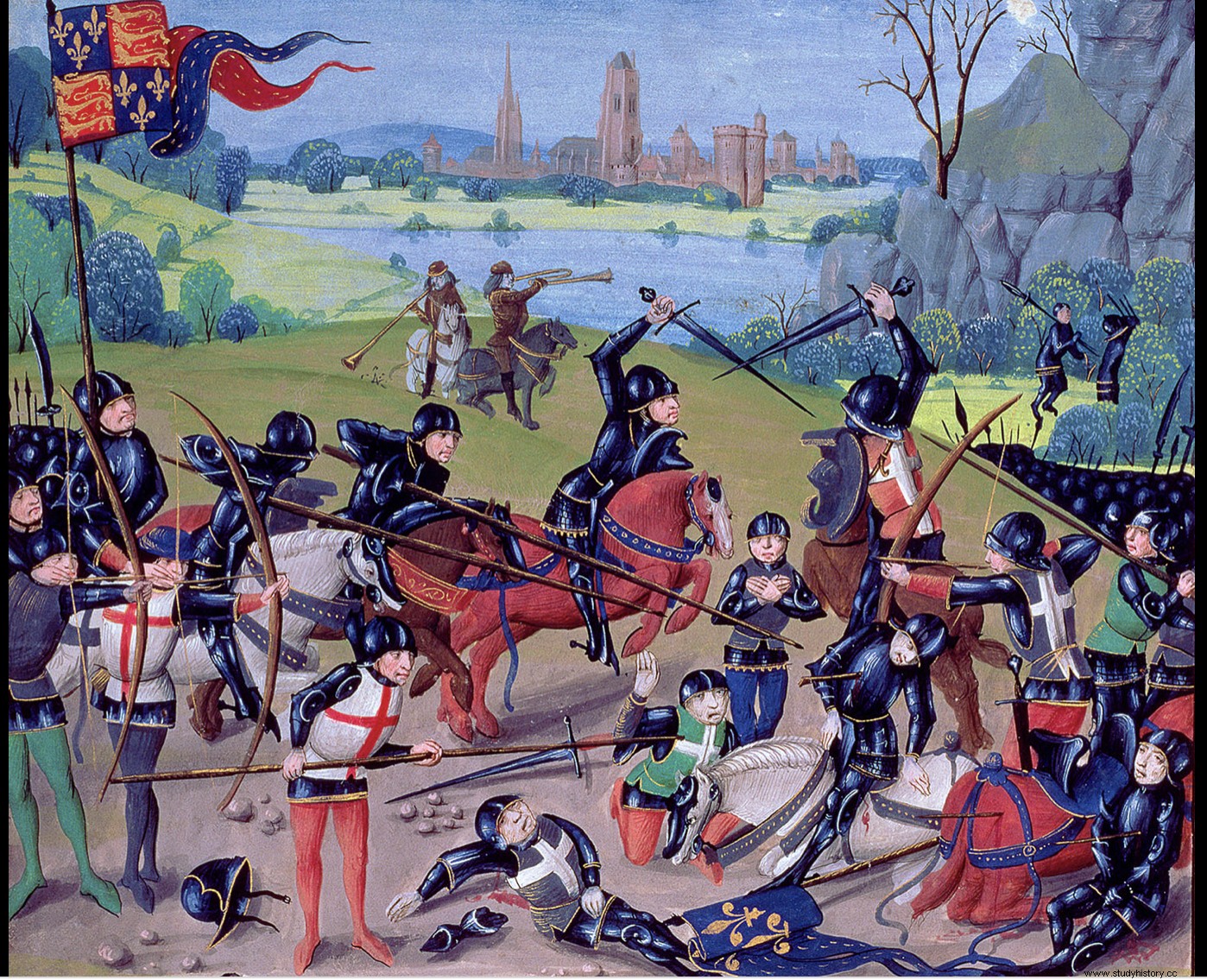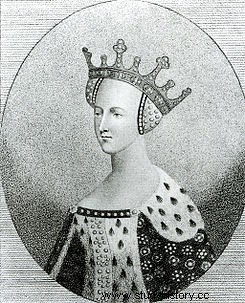Entry taken from the book The Plantagenets
Henry of Monmouth was born in the castle of the same name on September 17, 1387. He was the son of Henry Bolingbroke and Mary de Bohun. In principle, his family branch was not destined to reign in England, since they were descendants of the third son of Edward III (John of Ghent) and when our protagonist was born the throne was occupied by Richard II, grandson of the eldest son of Edward III (Edward of Woodstock ), whose second son (Lionel of Antwerp) was also living and had offspring.

But in 1399, after a series of events recounted in the entry dedicated to Henry Bolingbroke, Bolingbroke deposed his cousin Richard II and ascended the throne as Henry IV, the first monarch of the Lancastrian branch of the Plantagenet dynasty.
Henry of Monmouth thus suddenly became heir to the throne and Prince of Wales. In 1406 Henry IV made a surprising request in Parliament:he requested the appointment of a permanent council to help him in the task of running the country. That year the first health problems of the king had occurred.
At that moment the figure of the Prince of Wales began to emerge. At the age of nineteen, he had already distinguished himself in campaigns against the Welsh chieftain Owain Glyndwr (who also has his blog entry), in which he was wounded and took a scar that would accompany him for life as a souvenir of the battle. It also had another great advantage:he was not affected by the accusations of usurping the throne that his father had to endure. Full of ideas on how to run the country and wanting to assume more of a leading role, he was part of a nine-person council appointed to carry out a complete reform of the delicate subject of the kingdom's finances.
Although in general the relationship between father and son had been good, it was inevitable that, as he grew up and tried to impose his criteria, there would be differences between one and the other in religious matters (the Lollard heresy was at its peak) and in war. with France.
In 1412 a significant event occurred. The prince was accused of having appropriated funds intended for the Calais garrison. Determined to defend himself against him, he traveled to London accompanied by his Praetorian Guard of young noblemen and a multitude of followers. He arrived at Westminster, where his stormy betrothal interview with his father ended with the prince reiterating his loyalty to the king and with father and son reconciled. 
The differences between the two would probably have continued to grow if it had not been for the king's health condition deteriorating by leaps and bounds. He died on March 20, 1413.
The ascent to the throne meant for Henry of Monmouth something more than wearing a crown and being called Henry V. During the last years of his father's reign he had drawn attention for his dissolute behavior, but after ascending the throne there was a radical transformation. in their behavior. The cause of this must be sought in the change that meant helplessly assisting the brake that his father put on all his ideas and government initiatives to see himself overnight in a position to carry them out without a superior power that would oppose him. .
At twenty-four he was a natural leader in government and on the battlefield, endowed with the vitality of the early Plantagenet and the strength and physical attractiveness of some of his most illustrious predecessors. His government was firm without being tyrannical, he was a competent administrator, promoted important tax collections but without wasting public money, and maintained good relations with both the nobles and Parliament.
Henry V set his sights on what was his great objective:the truce signed by Richard II with France ended in May 1415 and the king was determined to resume the family claims to the throne of France initiated by his great-grandfather Edward III. He sent messengers to Charles VI of France claiming his right to be recognized as heir to the French Crown or, at least, that the historic family possessions of the Plantagenets recognized to the English kings in the Treaty of Bretigny (1360) be returned to him in the southern and western France, reclaiming the title of Duke of Normandy. He also requested the hand of the king's daughter, Catherine of Valois, who should come accompanied by a very generous nuptial dowry.
In March 1415, the dauphin (heir to the French Crown) sent a message to Henry V in which, in addition to making fun of his youth, he told him that he could hardly aspire to the French Crown when he was not even the legitimate king of England. . It was a rather sneaky declaration of war.
Henry V left Southampton and set foot in France on August 14, 1415. His first objective was to seize the historic Duchy of Normandy, lost in its day by John Landless, and he began by laying siege to Harfleur, but it took him more than a month to take the city, while the pestilence of the nearby marshes took its toll on his army, which was decimated. Henry had to change his plan to launch the invasion of Normandy, he sent the sick and wounded home and headed towards Calais.
In principle it was a trip that should take about eight days. But the French had destroyed all the bridges and fords to cross the mighty Somme river, so the English had to take a long detour that involved traveling twice the distance initially planned, which would also take the same amount of time. Despite having received some reinforcements, the English army was reduced from around ten thousand men who initially formed it to just under seven thousand soldiers, weak, hungry, sick and exhausted by the long marches to which they were subjected to reach Calais before being overtaken by the army the French had sent in search of them. But it was useless. On October 19, the last of the English managed to cross the Somme. The French army was already across the river, standing in their way to Calais.

Enrique V realized that it was not going to be possible for him to arrive and he prepared to present resistance in the place from which he could best take advantage of the orography to present battle. This place was called Agincourt and there they met on October 25, 1415, the exhausted, sick and hungry English army of seven thousand men with a rested and well fed French army of more than twenty thousand soldiers, the cream of the aristocracy, French cavalry and infantry. The English archers destroyed the French army again, definitively earning the reputation of being the most hated enemy of the French.
After a long and intense battle, the English prevailed, suffering less than a thousand casualties. On the French side more than twelve thousand men died, but these losses would not only prove lethal in the following years due to their number, but also due to their quality, since among the deceased there were three dukes, five counts, more than ninety barons. and about two thousand knights.
After the overwhelming victory at Agincourt, Henry V resumed the negotiations in an advantageous position. But, despite the mediation of the Emperor Sigismund, the dialogue with France was complicated, with the king mentally ill and the dauphin so obsessed with avenging the humiliation suffered on the battlefield, that he proceeded to block English access beyond what was possible. conquered. Despite everything, in 1416 the English naval forces managed to defeat the French ships and broke the sea blockade.
Enrique requested and obtained from Parliament, in October 1416, a tax to resume the campaign in France. He landed again in August 1417 and gradually took control of all of Normandy, taking important cities such as Caen (September 1417), the hometown of William the Conqueror, Falaise, (1418) and finally the capital, Rouen, which resisted the siege for six months. before falling (January 1419). The English thus recovered all of Normandy and made it clear that he had returned to France to stay and that there was no French force that could oppose his army. He began to distribute land in Normandy among his followers.

Negotiations were opened between Henry V and the French King Charles VI, who was accompanied by his son, the dauphin, and the Duke of Burgundy, who intervened as a mediator between the parties. The project of marrying Henry V to King Charles VI's daughter, Catherine of Valois, and designating both as heirs to the French king and regents in his name due to his incapacity, was resumed. The fact that the Duke of Burgundy was assassinated while on mission at the Dauphin's court caused suspicion to fall on him and paved the way for Henry V, who stood unopposed at the gates of Paris and claimed the French crown. .
After arduous negotiations, in the spring of 1420 the Treaty of Troyes was signed by which Henry V was recognized as heir to the French throne and his marriage to Catherine of Valois was agreed. In December of the same year the couple triumphantly entered Paris, the French Parliament ratified the Treaty of Troyes and removed the dauphin from succession to the throne due to his inability to respond satisfactorily to the charges relating to the death of the Duke of Burgundy. In this way, upon the death of King Charles VI, the kingdoms of France and England would be governed by the same monarch, although both countries would continue to retain their rights, their freedoms, their customs and their laws.

Not everything was congratulations after the Treaty of Troyes. Many French people did not accept being ruled from London and they grouped themselves around the Dauphin (the future Charles VII) who held in his power extensive possessions in the center and south of the country. Many English were wary of the economic and political costs of becoming involved in French affairs. In fact, parliaments in 1420 and 1421 denied Henry V the necessary funds to continue financing his campaigns in France.
Henry V and his wife Catherine of Valois traveled to England, where she was crowned queen in February 1421 and the couple had a son in December of the same year. Henry had left his brother the Duke of Clarence as his representative in France, but not the whole country was pacified. There were still areas dominated by the Dauphin and others by the Duke of Burgundy. Precisely in a clash with forces loyal to the dauphin at Bougé on March 22, 1421, Clarence was killed and Henry had to return to France to personally take charge of his affairs there. Henry spent the winter in a long and complicated siege of the city of Meaux, which capitulated in May 1422, and Catherine joined him in France, leaving her child in England. But Henry V had fallen ill, probably of dysentery, and he died at Vincennes on August 31, 1422.
Whether Henry V's reign was a glorious period of conquest and consolidation, or whether it was a king's selfish quest for personal glory, not meant to last (according to Roy Strong, "... somehow, if Henry V had not resumed the war with France, he would have been an even greater king"). But what is certain is that his reign constituted a period of affirmation of English identification beyond the glory of Agincourt:all the official documents of his reign began to be written in English in 1410. The letters of the monarch himself were also written in English, as well as documents of the unions of the country. Also in the civil field he generalized the use of terms such as Anglia nostra, and in the religious one, the Archbishop of Canterbury spoke of "the Church of England".
The death of Enrique V supposed an absolute overturn to the glorious situation that was presented for the English interests. The warrior hero of Agincourt had been designated heir to the French Crown and was in a position to make a dream come true that not even the initiator of the Hundred Years' War, Edward III, had believed possible:to unify the Crowns of France under his command. France and England and start a new era for both countries.
His premature death left all these ambitious projects without effect, and the fact that he had only had time to father a son and that he was not even a year old when his father died, was a serious brake on the English aspirations over France... but that is another story, part of it narrated in the blog entry dedicated to Catherine of Valois,
Image| Wikimedia Commons/ Author Archives
